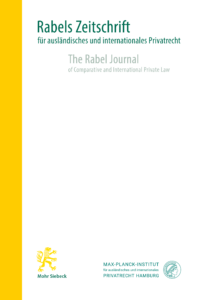Out now: Issue 4/2024 of RabelsZ
 The last issue of RabelsZ 2024 has just been released. It contains the following contributions (which are all available Open Access: CC BY 4.0):
The last issue of RabelsZ 2024 has just been released. It contains the following contributions (which are all available Open Access: CC BY 4.0):
Holger Fleischer & Simon Horn, Unternehmensskandale und skandalgetriebene Regulierung: Die Stavisky-Affäre als Prüfstein (Corporate Scandals and Scandal-Driven Regulation: The Stavisky Affair as Touchstone), pp. 648–693, https://doi.org/10.1628/rabelsz-2024-0062
This article is an opening contribution to a new research program on corporate scandals and their legal treatment around the world. In addition to addressing civil and criminal sanctions, the main focus lies on the widespread but under-researched phenomenon of scandal-driven reform legislation. Selected case studies from the past and the present will help to create a better picture of the connections between business scandals and legal regulation. A first touchstone for such systematic comparative scandal-based research is found in early 1930s France with the Stavisky affair – a case that not only kept the business and financial world in suspense, but one that also shook the political foundations of the Third Republic.
Chukwuma Samuel Adesina Okoli & Richard Frimpong Oppong, Enhancing the Draft African Principles on the Law Applicable to International Commercial Contracts – Innovations for the African Context, pp. 694–733, https://doi.org/10.1628/rabelsz-2024-0050
This article examines the draft African Principles on the Law Applicable to International Commercial Contracts, evaluating current and proposed choice of law rules in numerous African countries and incorporating global comparative perspectives. It argues that the African Principles should not only largely echo regional/supranational and international instruments like the Rome I Regulation and the Hague Principles on the Law Applicable to Commercial Contracts but should innovate to address the specific needs of the African context. The article suggests reforms in several areas: the scope of the African Principles, protection of weaker parties such as consumers and employees, government contracts, non-state law, and in provisions for the law applicable in the absence of choice.
Béligh Elbalti, The Applicable Law in Succession Matters in the MENA Arab Jurisdictions – Special Focus on Interfaith Successions and Difference of Religion as an Impediment to Inheritance, pp. 734–759, https://doi.org/10.1628/rabelsz-2024-0057
This article examines the question of the law applicable in cross-border successions in the MENA Arab region, with a particular focus on the issue of interfaith succession. It shows that the private international law treatment of succession matters depends largely on derogative factors, in particular the involvement of Islam as the religion of one of the parties. In cases where all the parties are foreign non-Muslims, the conflict of laws approach is usually observed, and the foreign law is applied. However, if one of the parties is a Muslim, nationality as the connecting factor is effectively supplanted by the religion of the parties, and the lex fori is applied. Unlike the usual perspective, which typically examines this approach through the lens of public policy, this article argues that the practice, of substituting the lex fori for the ordinarily applicable law in disputes involving Muslims, is based on an »unwritten principle of private international law« that effectively designates the Islamic religion as a de facto connecting factor under the cover of public policy.
Martin Lutschounig, Eingeschränkte Anwendung des lex fori-Prinzips bei internationalen Verkehrsunfällen (Limited Application of the lex fori Principle for Cross-border Traffic Accidents), pp. 760–786, https://doi.org/10.1628/rabelsz-2024-0061
According to the principle of forum regit processum, a court deciding a dispute applies its own national procedural law even in cases which are substantively governed by foreign law. It is therefore crucial how the individual legal question is categorized, namely whether it is classified as substantive or procedural. According to the prevailing opinion, this decision is made applying the lex fori. The situation is different, however, under the Rome II Regulation, as also the scope of the applicable law (lex causae) is subject to an autonomous interpretation. The article argues that the question of whether a foreign rule is to be classified as procedural or substantive is, therefore, not a question of national but of autonomous European law. A classification according to the lex fori would, by contrast, bear the danger of leading to different scopes of application of the lex causae depending on the place of jurisdiction. These problems are illustrated with reference to traffic accident cases in which a litigant seeks recovery of a supplementary claim, such as the pretrial costs of an expert opinion, an out-of-court settlement, or lump-sum costs.
As always, this issue also contains several reviews of literature in the fields of private international law, international civil procedure and comparative law (pp. 787–828). The issue closes with an index covering all contributions of the year 2024 (pp. 829–854).


